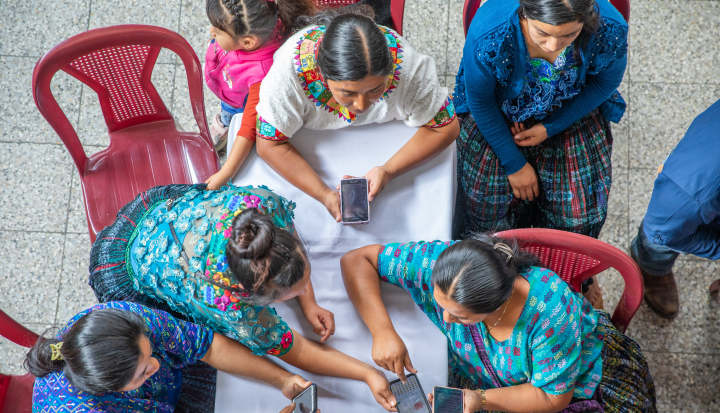Around the world, 3.6 billion people are climate-vulnerable, with the majority being women. As the climate crisis intensifies, it is no longer a question of if but when these communities will experience a climate emergency.
Last year, USD $223.7 billion was globally given as aid, an amount comparable to the annual GDP of New Zealand, Portugal or Qatar. Around 99% of traditional humanitarian aid is issued retroactively – only after the worst impacts of disasters have been experienced. Yet, thanks to advancements in science and technology, more than half of all humanitarian crises are predictable (and 20% are highly predictable).
What is Anticipatory Action?
Anticipatory action involves taking early steps to mitigate the worst effects of disasters before they occur. By leveraging early warning systems, AI, weather data, and pre-positioned resources, organisations can distribute cash and vital supplies days or even weeks before a flood, hurricane, or drought, for example, can occur.
At Mercy Corps, anticipatory action has proven transformative. Some of our recent pilot projects have demonstrated the impact of proactive measures across different regions and contexts:
Leveraging Blockchain for Drought-Affected Pastoralists in the Horn of Africa
Mercy Corps Ventures, the impact investing arm of Mercy Corps, is piloting a blockchain-based anticipatory action to aid drought-impacted pastoralists in the Horn of Africa. Pastoralism is a way of life for 50 million people across Sub-Saharan Africa, who depend on livestock for income and subsistence. Using blockchain, Mercy Corps facilitated access to digital wallets, enabling pastoralists to receive financial aid early in anticipation of worsening drought conditions. The pilot resulted in a 75% reduction in transaction costs and a 90% reduction in time for the delivery of donation funds, helping pastoralists protect their livestock and livelihoods before the drought intensified.
Remittances for Anticipatory Action in Central America
The flow of remittances – money transfers from family and friends abroad – are one pathway through which communities can receive funds faster, ahead of a disaster. In 2023, remittances to low- and middle-income countries reached $656 billion, according to the World Bank – a figure three times larger than Official Development Assistance. During the 2022-2023 hurricane seasons, Mercy Corps piloted a Remittances for Anticipatory Action model in Central America, which allowed families to send remittances early based on hurricane forecasts, equipping recipients with funds to prepare and protect their homes and livelihoods before a storm hit. The programme showed that early action can prevent damage and alleviate stress on emergency response systems.
Cash Assistance for Flood Resilience in Nepal
In Nepal, Mercy Corps launched an anticipatory action pilot to support 373 flood-prone households across 14 communities. When early warning systems detected rising flood risks, Mercy Corps distributed cash via ATM cards to enable families to invest in flood prevention measures. 79% of households indicated they were able to meet their basic needs during the floods, and 72% of recipients reported that the cash assistance arrived in time to meet their needs, helping them prioritise food, water or shelter improvements.
The Business Case for Anticipatory Action
A growing body of evidence demonstrates that anticipatory action not only saves lives and livelihoods, but it also helps to preserve people’s dignity and improves value for money. For example, research indicates that $1 invested in disaster mitigation ahead of time can save $6 in losses.
Expanding and enhancing anticipatory action should be a top priority for the private sector as it provides an opportunity to mitigate the risk to people, businesses and economies in a more effective, cost-efficient way. Here are some of the opportunities for businesses to enhance anticipatory action:
1. Invest in Early Warning Systems and Data Infrastructure
Many businesses possess the data, technology, and networks needed to strengthen early warning systems. By investing in improved climate data collection and analytics, companies can support real-time hazard predictions that drive timely humanitarian interventions. For instance, insurance firms, tech companies, and data providers can collaborate to enhance prediction accuracy and accessibility.
2. Support Pre-Disaster Financing Mechanisms
Insurers and financial institutions, for example, can partner with INGOs to create financial instruments that unlock funds for communities before disasters hit. A commitment to crisis financing at the local level can facilitate faster recovery, which benefits businesses reliant on stable markets and resilient communities.
3. Advocate for Policy Change
The private sector can advocate for national policies that prioritise anticipatory action, such as allocations within budgets for pre-disaster planning or ensuring climate resilience is built into public infrastructure projects. When businesses join these advocacy efforts, they help create an enabling environment for anticipatory action.
4. Enhance Resilience in Supply Chains
Businesses can further support anticipatory action by embedding resilience into their supply chains. This could involve working with local suppliers to develop climate-resilient strategies, pre-positioning recovery supplies in high-risk areas, or incorporating predictive climate models into decision-making processes. By planning ahead, companies not only protect their operations but also contribute to the broader resilience of the communities they serve.
With rising costs from increasingly frequent and severe climate-related disasters, it is essential to scale up investment in anticipatory action. COP29 – the “finance COP” – is a critical moment. As global leaders convene to discuss climate justice, we call upon business leaders to invest in anticipatory action and embrace proactive measures within their climate strategies. The time to act is now – before the next flood, drought, or hurricane strikes. Join us in leveraging the power of business for a world where climate resilience is achievable for all.
This article is part of our Climate Justice Series 2024. Explore our Climate Justice Community Forum Insights paper and discover other insightful articles and podcasts from our global community, published during COP29.








